The Bermuda Entrepreneurship Summit was created by Jared Kleinert and he opened up the Summit there in late November by welcoming us all and telling us we would encounter many unexpected things while also learning how we can better ourselves and our own entrepreneurial activities.
Jared then introduced Bermuda’s Minister of the Cabinet, Wayne Furbert, who himself has been an entrepreneur. I met the Minister when I arrived for breakfast before the formal program began. He told me he has been in politics since he was a teenager. When I mentioned to him that I live in Orlando, he told me he visits there from time to time and his next time will be taking his grandchild to Disney World in early 2020. But… of course. My city, Orlando, was “built” by one of the best entrepreneurs and artists of all time: Walt Disney. Today, Orlando attracts over 75 million visitors a year. Bermuda’s Minister of the Cabinet is one of them.
From the stage, Minister Furbert told us “Fostering entrepreneurship is a foremost priority for the government of Bermuda.” He talked about the hard work ethic of entrepreneurs. He then told us that entrepreneurship isn’t just a job, it’s a mindset. And part of the mindset of the entrepreneur is this: “One of your biggest fears in life is to live a life without purpose.”
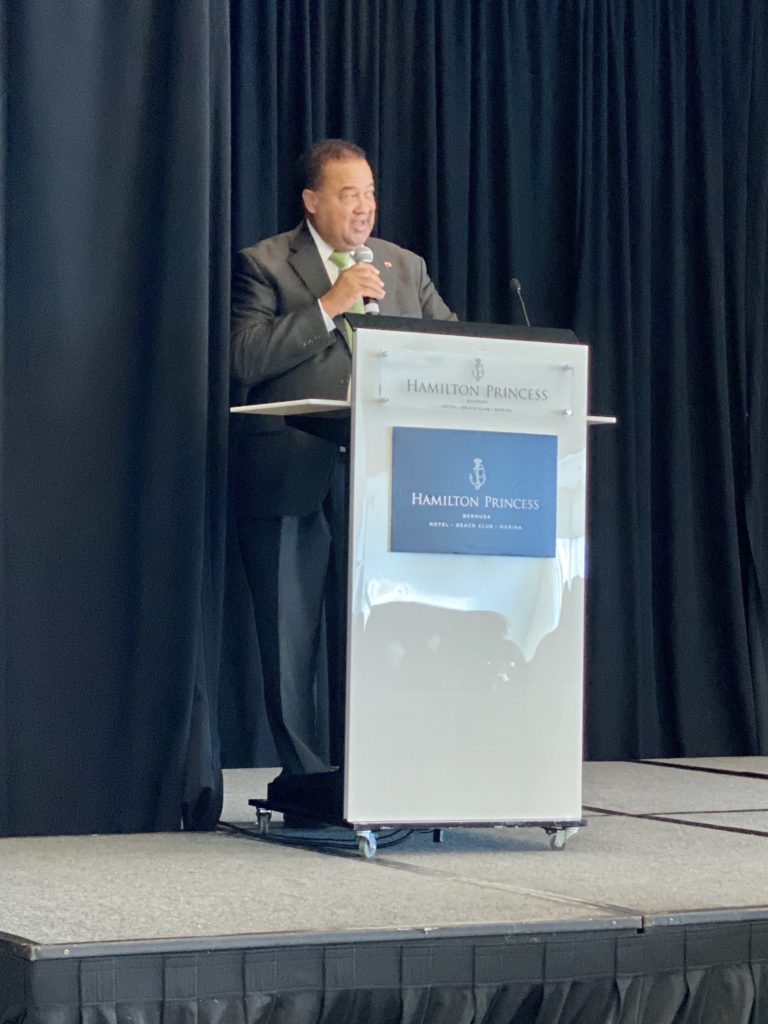
The next speaker on the agenda was my good friend Matt Thomas, who is also one of the co-founders of the Bermuda Entrepreneurship Summit with his friend and business partner, Jared Kleinert. Matt and I first met in June 2018 when I had him on Episode 45 of my Agents of Innovation podcast, primarily to talk about the organization he founded, Brawl for a Cause. I’ve been fortunate to see Matt on several of my visits to Atlanta since and we keep in touch regularly. He is the reason I was at this conference.
I’ve learned since meeting Matt that being a part of anything he is a part of is always a good thing. Matt’s favorite book, The Alchemist, which he re-reads every year, was suggested to me by him last year. Since reading that book, I’m just trying to follow the omens! I feel like part of following those omens led me to Bermuda for this experience. In fact, after giving up on the idea of coming here, Jared Kleinert reached out to me and things just quickly added up through a series of conversations: I needed to be here. Follow the omens, Francisco.
This was my first time really seeing Matt in his role as a motivational speaker. And he was fantastic. In addition to some breathing techniques he led us through, he also talked about the adversity he went through and how that led him to taking up chessboxing and winning the chessboxing world championship last year in India. After his talk, The Royal Gazette newspaper in Bermuda featured Matt’s story and did a great job outlining his presentation.
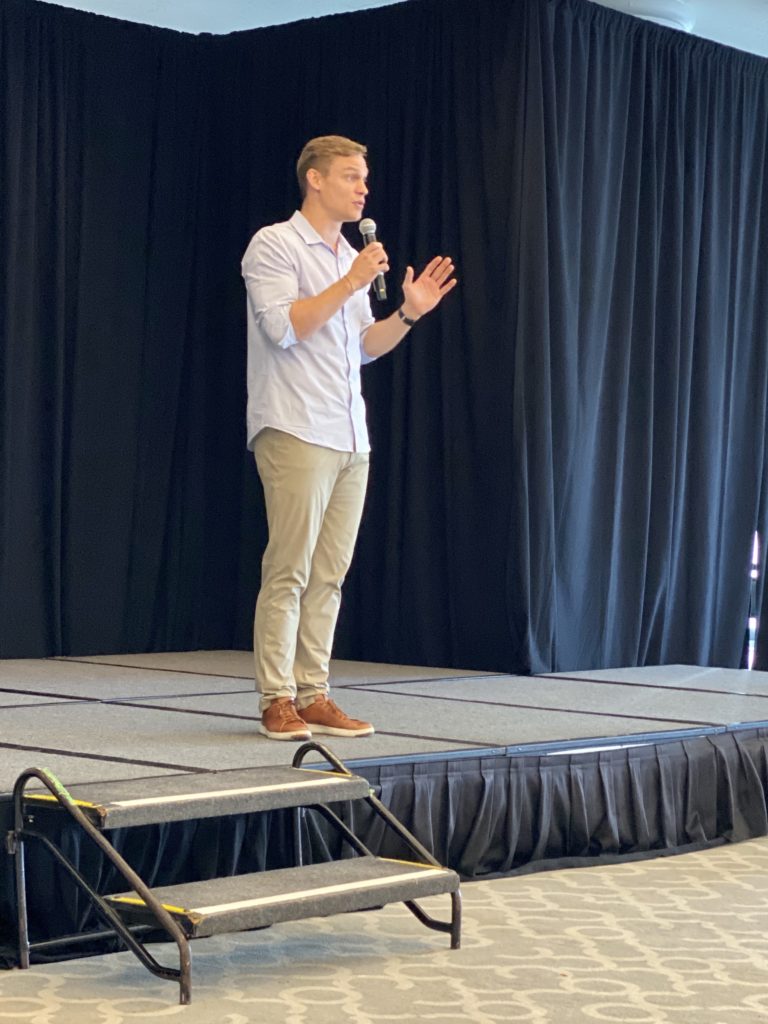
The main point I heard Matt make is how adversity can be redefining for us all – in a positive way. “Whatever adversity comes your way, these are all blessings. If we see them as such, we can move forward with a positive attitude and allow it to transform us.” He talked to us about the Chinese parable of the farmer and told us that in our own story and in our own experiences, it’s hard to tell if something is a positive or negative until we are able to have a longer timeline or perspective. Every time something happened in the farmer’s life, whether it seemed good or bad in the moment, he always uttered the phrase: “Good luck? Bad luck? Who knows?” I will be taking this parable away with me and probably remembering it for the rest of my life. In fact, in many conversations I am already finding myself repeating the farmer’s phrase: “Good luck? Bad luck? Who knows?” Matt is a master storyteller and listening to him also reminds me how important and effective storytelling is. We remember stories.
We then heard from a local entrepreneur named Gaynete Jones, who talked to us about how some of the most successful entrepreneurs are ones who made their own rules. She also talked to us a lot about our brand. Our brand is our identity. She reminded us: your logo is not your brand. She didn’t place a lot of importance on logos or business cards. In today’s age, it’s better to connect with someone on LinkedIn than to pass along a business card, which often ends up in the trash.
Gaynete wanted us to focus on whether we are providing value for others. She talked about how millennials just ignore sponsored posts and skip through commercials on platforms like YouTube. They aren’t an effective use of our resources for marketing. She suggested that we concentrate on “value-added” posts. For example, if you have a podcast, perhaps create a post about what your 10 favorite podcasts are. This can position you as a leader and an expert who others can look to. “Sharing knowledge puts you top of mind.” In other words, “you come to mind without having to market yourself.” People will search you out because of the consistent value-added knowledge you already provide on a regular basis.
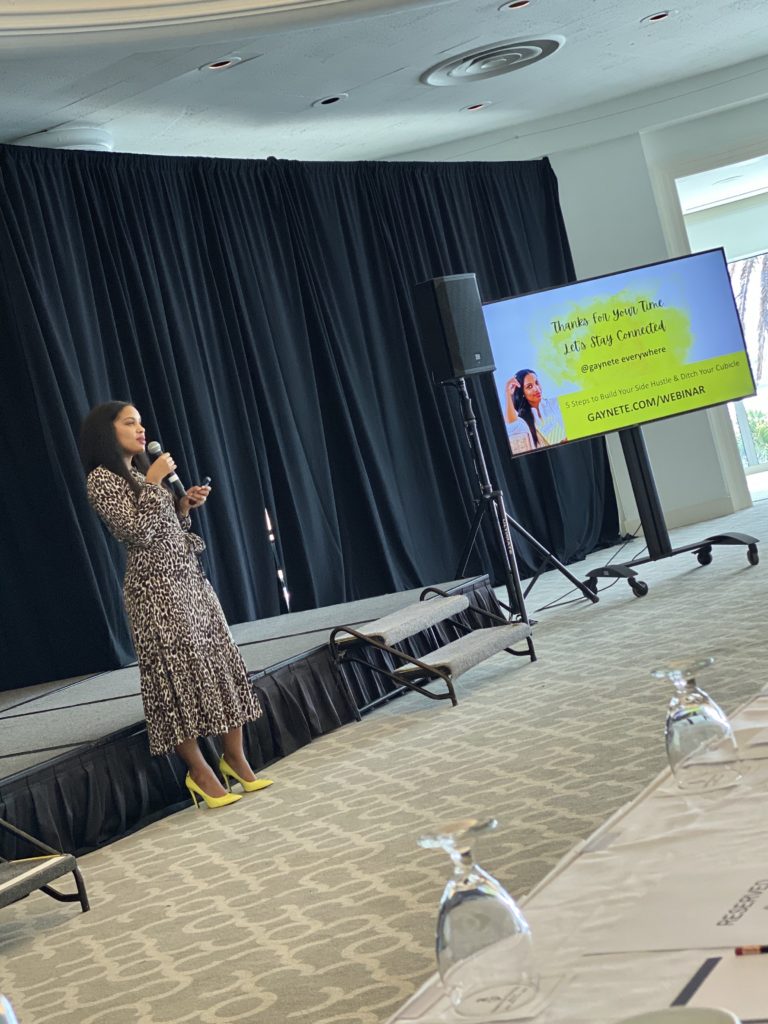
At this point, my friend Matt Thomas was sitting next to me, and whispered to me: “You do that really well, Francisco.” I’d like to think so, but Gaynete made me think about how I can do this better and more consistently. Also, it made me think about how many people are actually reading my value-added posts. One thing I’d like to focus on is growing my audience and finding more people to provide value to.
Gaynete also asked us if we know who our audience is, where they are, and what they are consuming. Then she threw us some startling statistics:
- 63% of millennials complete their transactions on their smart phones.
- 40% refer to online reviews and testimonials before purchasing a product.
- 67% believe they have a responsibility to share feedback about experiences.
- 75% prefer to buy an experience over something desirable.
- 63% use ad blockers online.
Elyse Archer was the next speaker. She built upon some of Gaynete’s themes and told us that lack of revenue isn’t the entrepreneur’s biggest problem; rather, lack of reputation is. Focus on your reputation and the revenue will come. But if your reputation isn’t good, the revenue will eventually fall away. “Results times reach equals reputation,” she said.
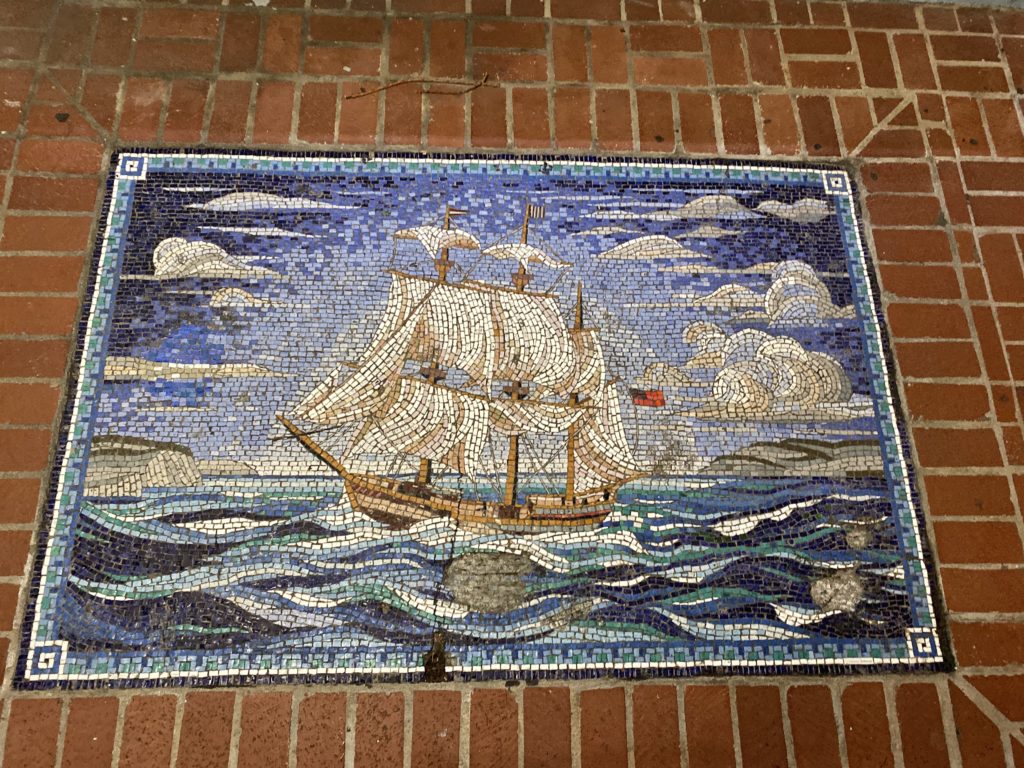
She encouraged us to have a narrow focus, become good at and well known for that one focused thing, and then we can expand what we offer or involve ourselves in. And our attention should be focused on a problem we are solving for others. She gave us example after example of successful people who may have a lot going on now, but “they focused first before they talked about a variety of topics.” She also offered us a free brand strategy call and to watch some free video courses at EA.BrandBuildersGroup.com. She must be taking her own advice. After all, she is offering us a value-add through these resources.
She also told us that everything we do on social media should “get people to your website and onto your email list.” And, show them your best right up front. “Save your best for first,” she said. This is part of what she described as The Relationship Engine.
She also encouraged us to think about how we are going to fill our social media, website, blog, and e-newsletters with content far in advance. She asked us to think about the following things:
- What are 52 questions your customer has?
- Post a piece of content each week that answers one of these questions.
- Spend 2 minutes a week creating this.
- Repurpose a piece of content in different ways, such as: record a video about something that answers one of those 52 questions; then turn it into an article; then a LinkedIn post; then posts for Facebook, Twitter, and Instagram. Most importantly, everything should link back to your blog or website.
The next speaker was Tim Francis who I had the pleasure to meet over dinner the night before. He is very much into “elite productivity.” When working with a team, especially on moving projects forward, he believes we shouldn’t communicate over email, but rather over a project management platform (like Slack, for example). This is a better way to delegate responsibilities accordingly. He also mentioned using a platform called Loom that can also better communicate to colleagues through video and screen sharing.
One of the big things Tim was selling us on, was a service he also provides: getting our own Great Assistant. He and many people who reach out to get a virtual assistant often try to go cheap and try to do DIY hires, which means that those assistants are often not good matches, or if they are, they are often in any number of countries around the world, in different time zones, and just not ideal. He thinks that all of us in the room could find many low-level, repetitive tasks we do every day and delegate them to a virtual assistant. His company can help us and he gave a very thorough presentation that pretty much persuaded me that I need to do this on some level.
Some years ago, Tim started with a virtual assistant of his own for five hours a week. That person spent time uploading blog posts and podcasts. Later, he moved them up to checking his email inbox and many other tasks as he got comfortable delegating more tasks, training up the assistant to perform them well, and giving them access to files and passwords.
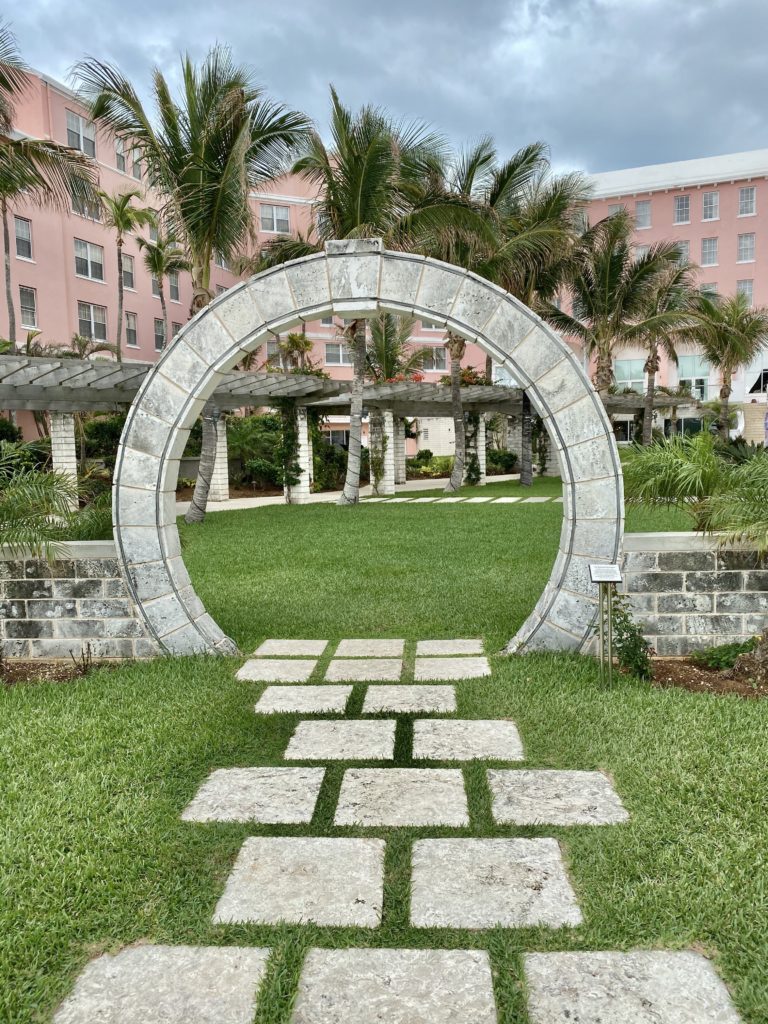
He said we should all look at the role of the surgeon as an example when considering what we should be spending our own time on. The surgeon doesn’t perform all the small, but necessary, mundane tasks that are required for the patient’s surgery. The most important thing he does is set the strategy for his team and come in and perform the high-level tasks of which he has unique expertise. The surgeon delegates everything else.
Also, everyone trying to reach you shouldn’t be privy to the high-level access of your time. Who should be able to get you on the phone easily? Who can text you and expect a personal response? This is where an assistant can help take care of small things and bring the high-level skills and access to your attention. Tim showed us many examples of people who delegated things appropriately to a great assistant and did higher-level things with their time, often producing much higher profits and revenue creation. In other words: getting a great assistant is completely worth the expense. Not getting one will cost you the revenue you could be making and the opportunities you could be missing.
We had a brief presentation after lunch by Shannan Slevin. She led us through some physical movement exercises, asking us all to stand up (picture an entire conference room standing up at their tables). She then guided us through some physical movements from where we were. She also led us through some breathing and mental techniques.
I should also mention Shannan is a certified yoga instructor. The next morning, I got up and joined her, Matt, my new friend David Nassau, and two others (including a random stranger we met) for a yoga session on the dock at the Hamilton Princess Hotel. It was my first full yoga experience. It was about an hour or so long and felt very peaceful, relaxing, and put me in the zone. It might be something to try more often. So, right smack in the middle of the entrepreneurship summit sessions, she put a little of her yoga and visual exercises to work on us and encouraged us to spend 30 to 60 minutes each morning before we begin our work, focused on visualizing what we want to accomplish that day.
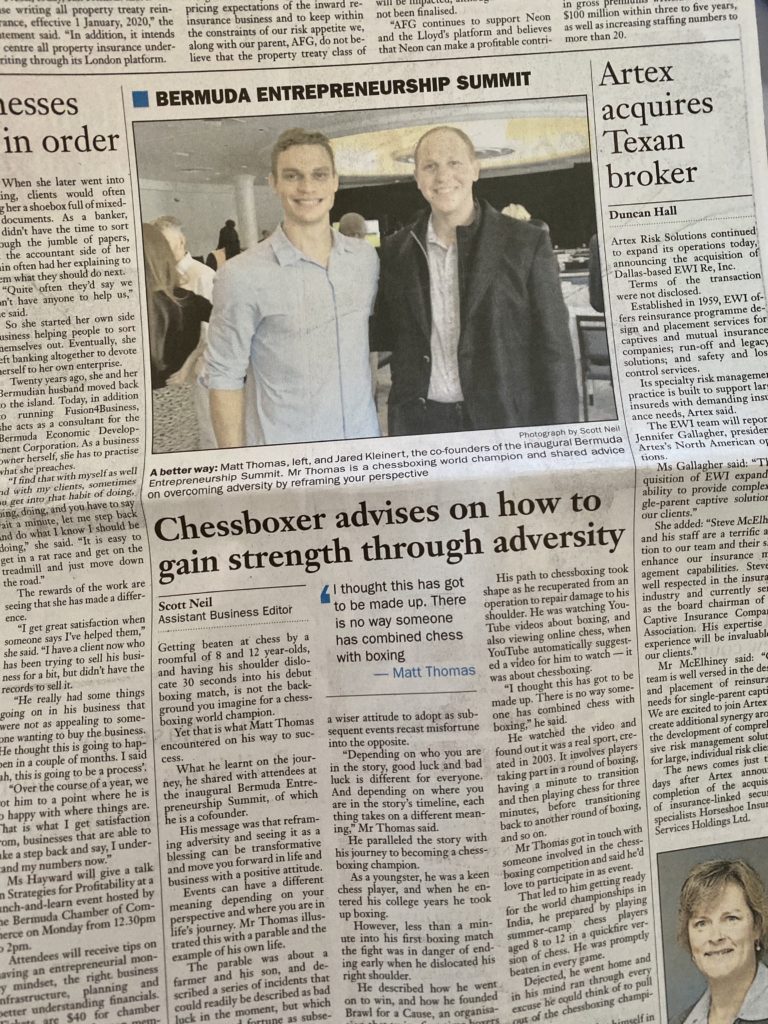
Well, I should say another unique thing I did this morning, ahead of the Summit’s main sessions, was attend a 7:30am daily mass at St. Theresa’s Cathedral parish, about a 15-minute walk from the hotel. I suppose in this way I was already putting the right focus and perspective to my day. And, on the 15-minute walk each way to and from the cathedral, I also got my blood flowing and put my mind on the right track for the day by seeing the beauty around me, including the bay, the water, and the boats along Hamilton, Bermuda’s Front Street walkway.
One of the final speakers of the day was Zach Ursiny. If Shannan’s job was to help us live well and in a good mental and physical state, I think perhaps Zach’s job was to be show why good coaching matters and how we can best work with our colleagues, as well as resolve conflict productively. He said that all good teams have conflict – in fact, we should be concerned if a team never has conflict. But conflict should be recognized, and the team should work to resolve it to move forward successfully. I believe Zach’s father is a psychological counselor and so it is neat to see him bring this element of psychology to how coaching, counseling, and conflict resolution can help us all be better and grow stronger. There is a lot that goes into being a successful entrepreneur!
In the late afternoon, we also heard from a panel of entrepreneurs and leaders in the business community in Bermuda. One woman, Erica Smith of the Bermuda Economic Development Corporation, told us that “We are creating more entrepreneurs in Bermuda, but more importantly, we are growing an entrepreneurial mindset.” That’s exciting and that’s a real achievement. A community with an entrepreneurial mindset is a healthy one; it’s one that is moving forward with productive, creative, innovative people.
The island of Bermuda today has a population of about 65,000 people. It’s very small. But that also means there can be a strong, tight-night community formed here and that ideas can spread throughout this one community, this one nation (or territory), much faster than in a very large nation with a lot of bureaucracy.
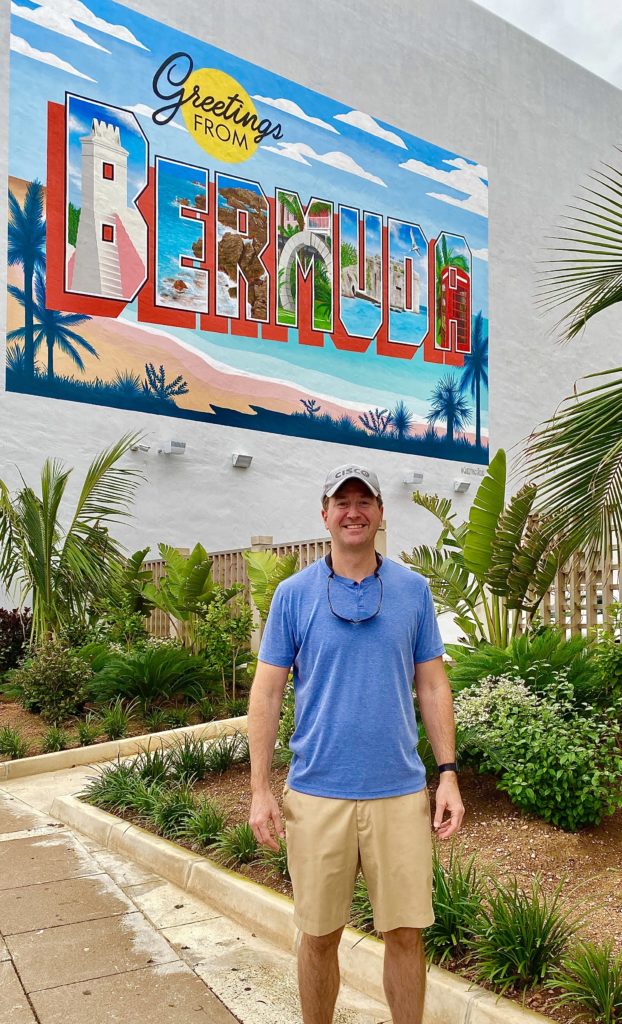
During the Bermuda Entrepreneurship Summit, I was able to converse with many entrepreneurs who had all kinds of businesses, many offering services, products, and experiences, including some catering to tourists. One thing I did hear was how some licenses or permissions to do something took a while, often due to government regulations or some red tape that the entrepreneur was required to go through, but eventually it was approved and their business was off and running. Everyone I talked to had a positive attitude. Maybe they were motivated by some of the speakers, but I also think they had what Erica Smith mentioned on one of the last panels of the day: “an entrepreneurial mindset.”
I know that whatever entrepreneurial mindset I came to Bermuda with, I am leaving with an even stronger, more knowledgeable one and I’m excited to get to work as I continue to follow the omens.
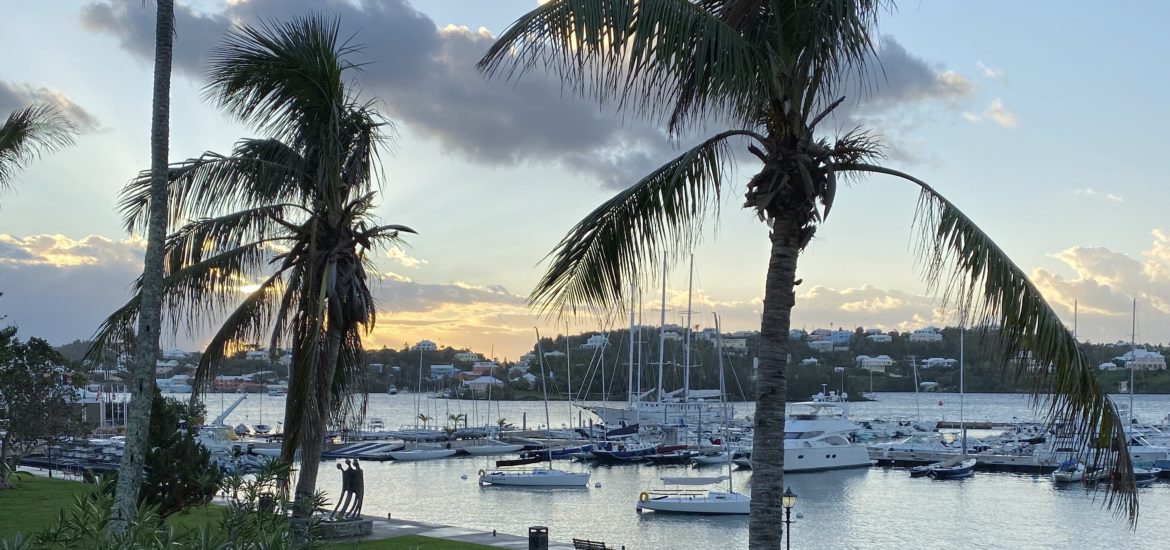
So glad that you had this opportunity to help you to grow in your current and future endeavors! Thanks for sharing your experience.